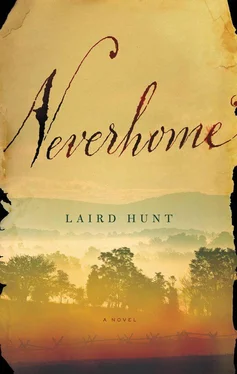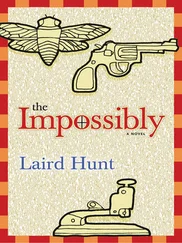I crouched a minute and scraped at the soft surface. I lay on my side with my ear to it. Sun for a blanket. Tune one of the girls had sung on my lips. The dirt below me felt heavy. Like it might whisper. Whisper some secret. I fell asleep and dreamed the world had run to its end.

I don’t think I would have done anything much more than imagine a visit to Yellow Springs, Ohio, if a tinker selling bedsheets and colored socks hadn’t asked me was I bound there. I hadn’t been, hadn’t even had any idea I was near it, but after he had taken out a sample of his wares, and I had told him I did not at that present time need anything he had to offer, even if the red of his socks was, as he had said, very fine, I followed his direction over a hill and down a good road and took myself into town.
It was a handsome place. Good, quiet streets and neat houses had squared about each one of them its own pretty yard. There was a well-made church and churchyard with more than a few fresh graves. I found the General’s cousin, buried beneath pink granite and a young almond tree fluttering its first raggedy blossoms in the breeze. The stone had careful carving you couldn’t see from afar. There were stars and birds. There was a bright harvest moon. If you looked close you could see a river curling off toward heaven. Under the cousin’s name were his dates. Under his dates was the word Unafraid.
It didn’t take much asking to find what had been the cousin’s house. I meant just to have my look from afar but there was the woman of the house chopping hard at some rosebushes spoke to me and told me I had to come in. I said I had been scrabbling with outlaws and orphans in the countryside and wasn’t fit for stepping in a fine house, but I had known her husband and, if she liked, would sit with her a minute on her porch. She took off her garden hat, wiped a hand through her hair, sat me down, and bade me wait, then five minutes later brought out cool tea and sandwiches on soft bread. She brought a whole stack of those sandwiches, which had ham and sweet pickles swimming in fresh butter, and I worked hard at not eating them too fast. Once or twice as I ate I started to speak but she held up a hand. She was as fine to look at as her town. Into her middle years but elegant along with it, maybe more so for her age, soft and flinty both, gentle at the same time as hard. She sipped quietly at her tea and looked out over her garden. She had pink and purple hydrangeas blooming, white lilacs, a pale-trunked line of peach and apple and sour cherry trees. There were maples everywhere well into leaf and you could see the church steeple shining white beyond.
“Where did you know my husband?” she said when I had eaten the last sandwich and wiped my hands on my napkin. I didn’t like for her to look at my fingers for they were nothing but dirt and chewed-down nails. Even if I had tried to scrub at them some at a well on the way over to her house.
“I knew him to look at in Maryland and Virginia and some earlier in Kentucky too. He was about as brave as they make them. He would just stand straight up through a battle, calm and quiet. Like it was Sunday afternoon and we’d all gone home from church to eat these sandwiches of yours.”
She smiled and she shivered. You could barely tell which was which.
“He did his duty, no doubting that. There wasn’t a man in his company would claim the contrary,” I said.
“Were you attached to his regiment?”
“I did laundry and sundry jobs. Drove a wagon now and again. I can cook a little if I have to. Helped the sutlers spread their wares.”
She had a sharp eye and she looked a good while at me. If I had had on my uniform, she would have seen straight past it like it wasn’t there.
“And now you have left that service and walked all the way up here from Virginia?”
“I’m heading back to my husband, who stayed home for the war.”
“Ah,” she said. “A young married woman, far from her home, traveling with an army at a time of war. That’s an extraordinary image.”
“Yes, ma’am,” I said.
“Penelope gone to the war and Odysseus staying home.”
“Ma’am?”
She was quiet awhile and sipped her tea. I did the same. It was good tea. Plenty of sugar and more of mint. There was birdsong in the air. Robin. Cardinal. Wren. One or two I didn’t know. Some yelling to add to it from a jay. It was a big brick house and just the porch would have done for fifty. We didn’t have a porch at home, though we had often set our chins toward the subject and talked about building one.
“Please excuse me a moment,” she said.
She stood and went into the house and came back out with a green velvet sleeve. Out of this sleeve she took a gilt frame. She held it close to her. The gilt had been well wrought and looked pretty against her dark blue dress, like a window onto the other world.
“We had this likeness made before he left on his orders. He was still a professor then, finishing up his spring term.”
“A professor,” I said.
“Here at Antioch, of course. The college is shut down now. We expect it will reopen after the war. It stands just over there.” She waved toward some poplars. There was a hint of stone through the trees, a pair of peeping towers, the corner of a wall, the mossy curve of a well. She handed me the frame and asked me if her husband had still resembled his likeness. If the war hadn’t ravaged his fine looks away entirely. She had seen him after he was wounded, she said, and had not liked what she saw and had begged him to stay at home with her after his recovery.
“This is your…?” I said.
“My husband,” she said.
I had in my hands a picture of the Colonel, my Colonel who had become a General.
“Then you are not the wife of the man lies yonder under the pink stone who was the General’s cousin.”
“The General’s younger brother.”
“His brother.”
“My husband called him his cousin so that the connection would not be too clear. Neither too clear nor too close.”
I sat silent. My brain making its rearrangements.
“He was not well, of course, and he would not be parted from the General. The General was good to him. Very good.”
“Very good,” I said, my brain still trying to make the new shape.
“Yes,” she said.
“Yes,” I said back.
Then I had it all. Nothing was any different.
“I never spoke to him but once; still, I saw him many a time. Like I said it a minute ago, he did his duty.”
“Just as you did yours.”
I looked at her. She had her eye on me again and was smiling. It was a kind smile. There wasn’t any shivering.
“Has the General changed, in your reckoning of it?”
“Yes.”
“Yes,” she said. She crossed her feet in front of her and sipped her tea. She looked hard at me again.
“I know you did not do any laundry and wagon-driving down in Maryland and Virginia, unless it was your own laundry and the wagon-driving was in your official orders.”
I did not answer her, just sat holding the likeness of the General carefully in one hand and my glass carefully in the other. She took a letter out of a clever pocket sewn with crimson ribbon onto the front of her dress. She unfolded it and read.
My Dear,
There is a young woman who disguised herself and fought bravely and indeed with considerable distinction for a time in my regiment. She was badly treated upon her discovery. By myself not least of all. After paying me a visit earlier this afternoon to leave me a warm coat she no longer required, she is gone away from us now and I hope has left war behind forever. I do not know why I think this, and so hesitate, my dear, to write it, but I somehow expect she will be coming to you. Look for her along the road. Treat her well if she arrives. Give her your welcome. Let her know she has mine too.
Читать дальше













